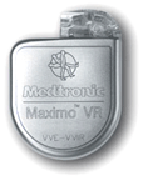
February 1, 2011 – Despite the benefits of therapy with implantable cardioverter-defibrillators (ICDs), inappropriate shocks from the devices are common and place patients at a greater mortality risk. These were the conclusions drawn by a Dutch research team that examined the incidence, predictors and patient outcomes of inappropriate ICD shocks in a large, real-world patient population. Published in the Feb. 1, 2011, issue of the Journal of the American College of Cardiology, the study showed that inappropriate ICD shocks were more than just painful and psychologically disturbing—they also impacted patient survival.
Implantable cardioverter-defibrillators, which provide an electric shock whenever they sense an abnormal heart rhythm, have shown to provide a “substantial and significant” mortality reduction for high-risk patients with cardiovascular disease. Because the treatment “still has drawbacks,” the team decided to examine inappropriate shocks delivered in response to rhythms other than life-threatening ventricular tachycardia or ventricular fibrillation.
Researchers from Leiden University Medical Center in the Netherlands examined the medical records of all patients who had an ICD implantation at the hospital from 1996 to 2006. Specifically, the team analyzed how often inappropriate shocks occurred, what characteristics were associated with inappropriate shocks, and how inappropriate shocks influenced patient outcomes. The team’s main follow-up period was 41 months (±18 months), but they also recorded data at one year and five years. Patients treated with an ICD met the international guidelines for ICD implantation developed by the American College of Cardiology, the American Heart Association, and the European Society of Cardiology.
Of the 1,554 patients who had complete records, 13 percent (204) (95 percent confidence interval [CI]: 11 percent to 14 percent) experienced an inappropriate shock during the main follow-up period, which led to a total of 665 inappropriate shocks. The cumulative incidence of inappropriate shocks “steadily increased” across the extended follow-up period, reaching 18 percent of patients at 5 years (95 percent CI: 15 percent to 20 percent).
The team found that several factors independently predicted the occurrence of an inappropriate shock, including an age of younger than 70 years; a history of atrial fibrillation, nonischemic heart disease, or nonuse of statins; and the occurrence of appropriate shocks. The main cause of inappropriate shocks was misdiagnosis of supraventricular tachycardia, which occurred in 155 (76 percent) of the 204 patients.
In what the authors considered “the most important finding,” patients who experienced inappropriate shocks had a higher risk of all-cause mortality. A total of 298 (19 percent) patients died during the follow-up, and after adjusting for potential confounders, the research team found a 60 percent increased risk of death after experiencing a first inappropriate shock (hazard ratio [HR]: 1.6, 95 percent CI: 1.1 to 2.3; p = 0.01). The risk of mortality increased with each subsequent inappropriate shock, up to an HR of 3.7 after 5 inappropriate shocks.
According to study author Martin J. Schalij, M.D., Ph.D., the study’s finding that inappropriate ICD shocks impact mortality is a serious issue which necessitates that greater efforts be made to lower the number of these shocks. He notes that while two other analyses – both conducted as part of ICD clinical trials – have shown an association between inappropriate shocks and increased mortality, the current trial is the first to do so in a large, general-patient population.
“We need to make sure we are implanting ICDs in the appropriate patients, but often the patients that need ICDs most are also at risk of inappropriate shocks due to the misinterpretation of other fast heart rhythms that are not themselves lethal,” said Ralph G. Brindis, M.D., M.P.H., president of the American College of Cardiology and senior advisor for cardiovascular disease, Northern California Kaiser Permanente. “We suspect over time, increasing sophistication of the ICD programming will help minimize these episodes of inappropriate shocks.”
Reducing the number of inappropriate shocks may prove challenging, however. The researchers found that despite improved technology in ICDs, patients who underwent implantation between May 2004 and 2006 were at a greater risk of experiencing inappropriate shocks than those who received their ICD between 1996 and May 2004. Acknowledging this paradox, the authors wrote that evolving guidelines on who could receive ICDs may have caused more critical patients to receive the device in later years, ultimately increasing the number of inappropriate shocks experienced.
Although the researchers could not determine the exact cause of the increase, still more must be done to stymie this trend, Schalij noted.
“It is not acceptable that so many patients suffer from inappropriate shocks,” he said. “ICD therapy must be improved, through both patient-tailored programming of the devices and the development of superior algorithms to allow ICDs to better determine false alarms, such as supraventricular arrhythmias.”
For more information: http://cardiosource.org/ACC


 January 05, 2026
January 05, 2026 









